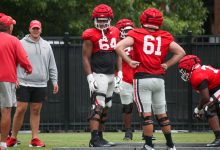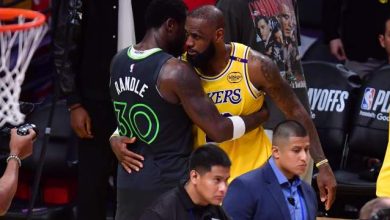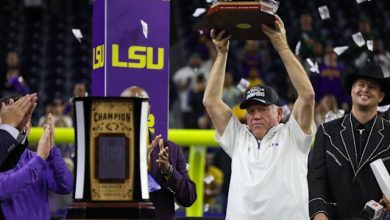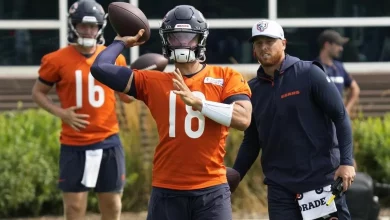2005 Texas Football was legendary. Vince Young led the Longhorns to a perfect 13-0 season, capped by an all-time great Rose Bowl win over USC.
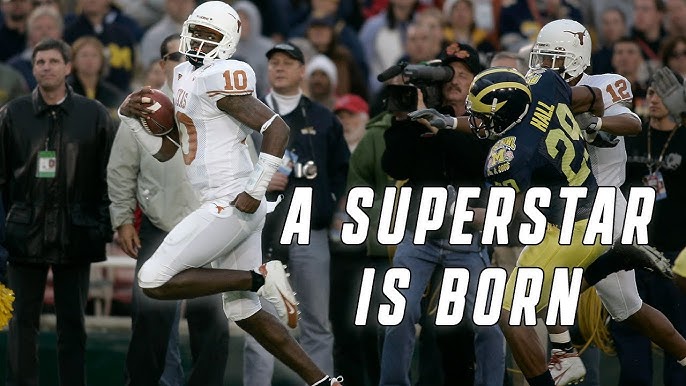
The 2005 Texas Longhorns football season remains one of the most iconic and unforgettable seasons in college football history. Under the leadership of head coach Mack Brown and quarterback Vince Young, Texas not only completed a perfect 13-0 season but also captured the 2005 national championship in thrilling, historic fashion. The journey was nothing short of legendary, filled with remarkable individual performances, nail-biting moments, and a once-in-a-lifetime Rose Bowl victory that etched its place in the annals of college football lore.
In a season that saw Texas overcome enormous challenges, including a vaunted opponent in the USC Trojans, the Longhorns’ championship run was defined by perseverance, talent, and heart. But it was Vince Young’s heroic play, his leadership, and his ability to elevate his team when it mattered most that solidified his place as one of the greatest college quarterbacks of all time and helped Texas achieve its first national title in 36 years.
When Vince Young stepped onto the field for the Longhorns in 2003, few could have predicted the kind of impact he would have on Texas football. As a raw but highly talented dual-threat quarterback, Young displayed flashes of brilliance during his first few years. Yet, it wasn’t until the 2005 season that he truly came into his own, evolving into a college football phenomenon.
Young’s journey to greatness began in high school, where he established himself as one of the most exciting players in the country. His combination of size, speed, and arm strength set him apart from most quarterbacks, and his ability to make plays with both his legs and his arm gave him the versatility that few players could match. Texas head coach Mack Brown recognized Young’s potential early on, and as the 2005 season began, Young was ready to assume the mantle of being the leader of the Longhorns.
Throughout the 2005 regular season, Young was nothing short of spectacular. He led Texas to an undefeated record, setting numerous records along the way. He completed 65.2% of his passes for 3,036 yards, 26 touchdowns, and only 10 interceptions. But it was his ability to create explosive plays on the ground that truly made him special. Young ran for 1,050 yards and 12 touchdowns, showcasing his incredible athleticism and making him one of the most dynamic dual-threat quarterbacks college football had ever seen.
The Longhorns were dominant throughout the regular season, with Young leading the charge against both Big 12 and non-conference opponents. Texas defeated their rivals, including Oklahoma and Texas A&M, while putting up impressive wins against teams like Ohio State and Texas Tech. But it was the culmination of the season that would ultimately define Young’s career and Texas’ legacy.
The Texas Longhorns entered the 2006 Rose Bowl as underdogs against the undefeated USC Trojans. USC, led by Heisman Trophy winner Reggie Bush and a roster filled with future NFL stars, was looking to cap off a 34-game winning streak and secure a second consecutive national title. They had been an unstoppable force under head coach Pete Carroll, and many believed that the Trojans were destined to continue their dominance. However, Vince Young had other plans.
The Rose Bowl is traditionally one of college football’s most prestigious and storied events, and this edition would prove to be no exception. What began as a clash between two titans quickly turned into one of the greatest games in the history of the sport. The Longhorns and Trojans exchanged blows throughout the game, with neither side able to pull away. The contest was a back-and-forth affair, with both offenses putting on a show.
USC struck first with a high-powered offense that was a well-oiled machine. Quarterback Matt Leinart, running back Reggie Bush, and wide receiver Dwayne Jarrett were a lethal trio, capable of scoring from anywhere on the field. The Trojans took a 38-26 lead with just over six minutes left in the fourth quarter, and it seemed as though they would win yet another national title.
But Vince Young was just getting started.
With the game on the line and the Longhorns facing a daunting 12-point deficit, Young put the team on his back. Texas drove down the field, scoring a touchdown with 4:03 left to bring the score to 38-33. Then, after a critical stop on defense, the Longhorns regained possession with less than two minutes remaining.
What followed was nothing short of breathtaking.
Vince Young led an 11-play, 68-yard drive that culminated in one of the most iconic plays in college football history. On 4th-and-5 with less than 30 seconds left, Young scrambled in the pocket before darting into the end zone for a six-yard touchdown run, giving Texas a 41-38 lead. The Rose Bowl stadium erupted as the Longhorns completed their remarkable comeback, and the Trojans were left stunned and defeated.
Young’s performance in that final drive was the stuff of legends. He showed incredible poise, making key throws and running the ball with unmatched athleticism. On the night, he accounted for 467 total yards—200 passing and 267 rushing—while scoring three touchdowns. It was a performance that secured his place in college football history and earned him the game’s MVP award.
The win was a crowning achievement for both Young and the Longhorns, and it served as a defining moment for Texas football. It marked the Longhorns’ first national championship since 1970, and Vince Young’s heroics ensured that his name would forever be synonymous with the program’s success.
The 2005 Texas football season is remembered not only for the unforgettable Rose Bowl but also for the lasting impact it had on the program and college football as a whole. Vince Young’s performance, and the way he carried Texas to a national title, made him a folk hero in Austin and a beloved figure in the state of Texas. His 2005 season earned him numerous awards, including being named the Big 12 Offensive Player of the Year, the Rose Bowl MVP, and a finalist for the Heisman Trophy.
Young’s impact was not just limited to his on-field accomplishments. His leadership, work ethic, and character set the tone for Texas’ success in the years that followed. He became a symbol of perseverance and determination, inspiring future generations of players to give everything they had for the team. His ability to thrive under pressure, particularly in the national championship game, showed the world that he was one of the greatest quarterbacks college football had ever seen.
In addition to Young’s individual brilliance, the 2005 Texas team was one of the most talented and well-rounded squads in recent memory. On defense, players like Derrick Johnson, Michael Huff, and Rod Wright provided a strong backbone for the Longhorns. The defense was opportunistic and tough, forcing critical turnovers and making big plays when needed. The offensive line, anchored by future NFL players, protected Young and paved the way for a powerful rushing attack led by Young and running back Selvin Young. The coaching staff, led by Mack Brown, orchestrated a game plan that played to the team’s strengths while also adapting to the challenges presented by USC’s high-powered offense.
For Texas fans, the 2005 season represented the culmination of years of anticipation. Under Mack Brown, the Longhorns had been knocking on the door of greatness, but they had always fallen just short. After years of heartbreak, including a loss to Oklahoma in the 2004 Red River Shootout and a close defeat to Michigan in the 2004 Rose Bowl, the Longhorns had finally reached the summit. And they did so in dramatic, unforgettable fashion.
But while the victory itself was sweet, the significance of the win extended far beyond the 2005 season. Texas’ national championship set the stage for the Longhorns to become a dominant force in college football during the next decade. The program had finally broken through to the top, and with Vince Young leading the way, Texas was poised to remain a powerhouse for years to come.
In the years that followed, Vince Young’s success helped redefine the quarterback position and set the bar for future dual-threat quarterbacks in college football. His ability to combine athleticism and passing prowess became the model for future players, and the Longhorns continued to recruit top-tier talent to build on the foundation he had established.
However, it was Vince Young’s individual legacy that remained most significant. Young went on to a successful career in the NFL, where he played for the Tennessee Titans and briefly for other teams. While his pro career didn’t reach the heights many expected, his college legacy remained untouchable, and the 2005 Rose Bowl victory became a defining moment not just for Texas but for the sport itself.
As for the Texas Longhorns, the 2005 national championship season was a crowning achievement, and it helped solidify the program’s place among college football’s elite. The team would face challenges in the years to come, but the memory of that perfect 13-0 season, led by Vince Young, will forever stand as one of the greatest accomplishments in college football history.
In the end, the 2005 Texas Longhorns were not just a championship team—they were a symbol of what can happen when talent, determination, and leadership come together at the perfect moment. The season remains a benchmark for excellence, a time when the Longhorns rose to greatness and Vince Young cemented his place as one of the greatest quarterbacks to ever play the game.

